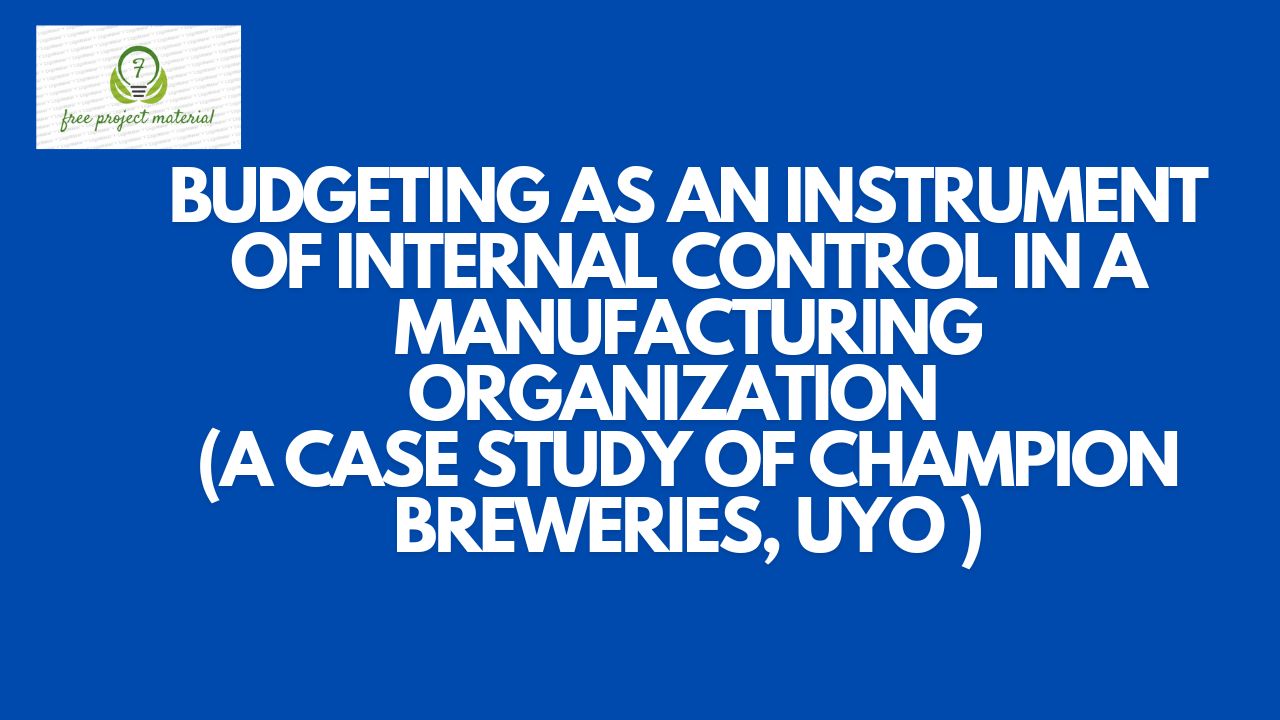ABSTRACT
This study aims of examining “Budgeting as an instrument of internal control in a manufacturing organization (a case study of champion breweries Uyo). The major objective of this study is to examine the role of budgeting as an instrument of internal control in a manufacturing organization. This study employed the descriptive and exploratory survey method and the study covers the champion breweries Plc. A sample size of 30 respondents were randomly selected at convenience from the total population 163. Questionnaire was used an instrument for collection of primary data and was analyze using simple frequency tables and percentage. The findings of this study revealed that budgeting plays vital roles in manufacturing organization which include regulation of the activities and functions of all the department of the organization provides management with basis for formation of economic policies, enables management to take an overall view of the company knowing which departments that needs special attention and helps in setting control in expenditure for each department of the company. Therefore, the researcher recommended manufacturing organization should exhibit a high degree of intelligence in formulating the budget of the organization and competent managers should be employed to handle the job.
CHAPTER ONE
INTRODUCTION
1.1 BACKGROUND OF THE STUDY
According to Enudu (2009), the business environment is characterized by a lot of uncertainties ranging from such factors as: Economic environment, political and legal factors, social environment, supply and demand forces, competition, consumer’s attitude and technological changes. A critical look at the performance of some of these manufacturing business organization will reveal a lot of business failures organization as a result of lack of proper planning against these uncertainties. According Drury (2000),proper planning of business helps in reducing uncertainties thereby providing the management of these enterprises with a clear direction by determine their course of actions in advance. According to Pandey (2010), for any enterprise to achieve these goals and objectives, they must be managed effectively and efficiently. Management is efficient if it is able to accomplish the objectives of the enterprise and becomes effective when it accomplishes the objectives with minimum efforts and costs. One of the ways in which the management can achieve these objectives is through profit planning and control or budgeting. According to Nweze (2011), Budgeting in its true word is the design of the future state of an entity and the effectives ways of bringing it about. Budgeting or planning involves the determination of the future course of actions for accomplishing the objectives of the enterprise. According to Lucey (2002), the main purpose of budget planning with the proper budget planning, the enterprise can no longer be under the mercy of Whims of fickle economic and social forces thereby replying on the ability to sense what is required (Nweze 2011). The value of budgeting control of any organization can never be overemphasized as these organization and companies have limited resources and these scare resources impose limits on the number of extent and rang of end result the organization was set out to achieve.
According to Nwoha and Ekwe (1999) some of these goals include maximizing profit or achieving some satisfactory level of performance, profit satisfaction achieving continual growth or ensuring the survival of the organization avoiding risk in making investment and performance a social service desired by others. According to Nweze (2011), a budget therefore co-ordinates the separate plans of different departments in an organization be it manufacturing concerns or non-manufacturing concerns and provide means of bringing both the marketing, production together. The proper co-coordinating of the various activities of these organization especially manufacturing concerns by their management is the main concern of this study.
Historical Background Of Champion Breweries Company Plc Uyo
Champion Breweries Plc, was incorporated as a private limited liability company on 31th of July 1974 with the name south east breweries limited because of political imperative in Nigeria, the company name was change from south east breweries to cross river breweries and thereafter to champion breweries limited .The later name, Champion Breweries Plc, on the 1st September 1992. On the 20th of November 1974, the government of the south eastern state of Nigeria signed an agreement with messengers HaableBarerie GMBH of Hambling (Technical partner) for the supply and construction of a Turkey Brewery in Uyo with a capacity of 150.00 hectoliters. The foundation stone of breweries was laid on the 19th of March 1975. On 11th December, 1976, the brewery was officially commissioned and its product champion larger beer lunched into the market with success. On the 22nd of July 1977, a second contract was signed with the technical partners to increase the capacity of brewery from 150,000 to 500,000 hectoliters. The foundation stone for the expansion which uncorrupted more sophisticated machinery was completed and put on the trial run in September 1979. The second production line was officially commission on the 11th of December 1979, the same year the company’s product champion leger beer and champion Malta won silver medal at an international contest in Paris, France. Champion ledger beer had previously won the election for beer and non-alcoholic beverage in Luxemburg. The champion breweries located at Aka offot along Nung Udoe Road about 3km from Ibom plaza, are mainly engage in production and distribution and distribution of champion beer and champion Malta (soft drink). Consequently upon pressure of demand for its product, the company took a decision to double its capacity to one million hectoliters. This third expansion which gulped substantial resource could not be realized. The Non-completion of the expansion programmed couple with lack of working capital and inadequate to close its doors for business between 1990 and 1991.All subsequent reactivation attempts did not yield desire result. With the advent of democracy in Nigeria in May 1999 the government of Akwa Ibome State made reaction of the breweries a cardinal activity.
Consequently, Akwa Ibom Investment and Industrial Promotion Council (AKIPOC) was charged with responsibility to reactivate the company pursuance to this mandate, AKIPOC, in conjunction with the board of directors of the company went to the market to solicit for core investor technical managers. In process, messengers, montgomy ventures incorporated of paroma with offices in Geneva, Switzerland was identified and brought into the company as core investors/ technical managers after a memorandum of understanding was signed. Based on a memorandum, reactivated committee was set up by the board of the company to work with core investment and technical managers for revamping of the company. The reactivation process, which commenced in February, 2000, lasted about nineteen months. Now the plants has been revamped and restricted to use one hundred percent locally sourced raw material. The brewery is now fully operational and the capacity is 500.00 hectoliters per annum. The reactive brewery was officially commission on 23rd October, 2001. Champion larger beers is now in the market and doing well, other product of the company including champion Malta will follow soon. Moreover, the company has been able to create employment opportunities for both the people in the locally one Aka Ibom State at large.
1.2 STATEMENT OF THE PROBLEM
Having stated earlier according to Drury (2009), that was the business environment is full of uncertainties as a result of such factors, Socio-economic issues, political unrest, demand and supply forces, legal issues and technological charges all these affect the management of any organization in one way or the other thus needed attention for proper management. You would equally recalled that organization goals and objectives are numerous but the means or resource for satisfying these needs are limited, at times not available hence need control to satisfy the high priority areas. As such, the researcher decided that investigate the use of budgeting as an instrument of internal control in manufacturing organization (A Case study of champion breweries).
1.3 OBJECTIVE OF THE STUDY
The objectives of this study are as fellows:
- To ascertain how manufacturing business organization control their level of profit making.
- To determine the strategies used by manufacturing business in Nigeria to plan their profit and estimate losses.
- To identify the types of budgeting in some of the manufacturing business organization in Nigeria as well as their efficiency.
- To highlight the consequences of poor budgeting on managerial planning and
- To determine the role of budgeting in management decision making.
1.4 RESEARCH QUESTIONS
- How does manufacturing business organization control their level of profit making?
- What are the strategies used by manufacturing business in Nigeria to plan their profit estimate losses.
- What are the types of budgeting used in some manufacturing business organization in Nigeria as well as their efficiency.
- What are the consequences of poor budgeting on managerial planning and control
- What are the roles of budgeting in management decision making.
1.5 SIGNIFICANCE OF THE STUDY
According to Nweze (2011), Budgeting is very important especially at this time of our economic development is that
It will help than determine and maintain an accessible level between high profit and how profit at a given time thus leading them to attains the various organizational goals and objectives.
1.6 SCOPE AND LIMITATION OF THE STUDY
This research work focus budgeting as an instrument internal control in a manufacturing organization (A Case Study of Champion Breweries).
The limitation encountered in the research is as follows:
Time: Here, time allowed for this research is inadequate for a perfect research to carried out by the researcher since there are other activities academic must be carried out.
Limited Finance: The give limited resources at the disposal of the researcher undertake transaction enquires, materials procurement, typing, finance resources constitute so many major limitations.
1.7 ORGANIZATION OF THE STUDY
This project research is organized into two (2) places, the first is the made up of preliminary page which are title page, certification, Dedication, acknowledgment, abstract, table of contents, and list of table while the second phase are divided into chapters as follows:
Chapter One contains the introduction, background of the study, statement of the problems, objectives of the study, research question, significance of the study, scope and limitation of the study, organization f the study, and definition of terms.
Chapter two reflects the current reviews of some workers on the topic and the variables on which thus study is based upon. Chapter Three highlights the research methodology to be used including the design of the study, sample and sampling techniques, instrument, method of data collection and data analysis techniques.
Chapter four focuses on the data presentation, analysis and interpretation which includes table of analysis.
Chapter five as the last chapter has to do with the findings, conclusions and suitable recommendation on the topic.
1.8 DEFINITION OF TERMS
Efficient: a firm is said to be efficient if it can manage their resources well.
Effectiveness; this entails proper co-ordination of these limited resources inform of both human and material resources to combat their responsibilities.
Planning: the design of a desired future state of an entity and effective of bringing it about.
Goals: performances can be defined as the assessment of the company towards reaching the targeted goals and objectives.
Budgeting: Budgeting is the preparation of a comprehensive and co-ordinated plan, expressed in financial terms for the operation and resource of an enterprise for some specific terms in the future.
Internal Control: This is defined not only as internal and internal audit but the whole system of controls, financial and otherwise established by management in order to carry on the business of the enterprise in an orderly and efficient manner, ensure and hence to management policies, safeguard the assets and secure far as possible the completeness and accuracy of the records.



